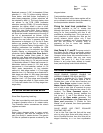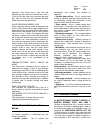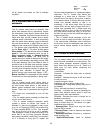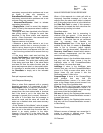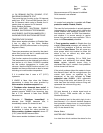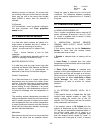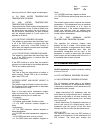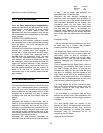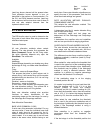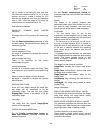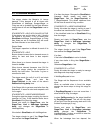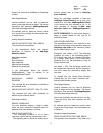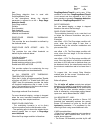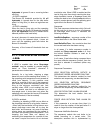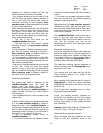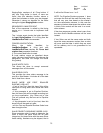
Date: 8-4-2010
Revision: 0
Form: 2396
hysteresis is ignored if one or more lag boilers
are firing.
• If LDSE is enabled:
The Burner Off threshold provided by LL off
hysteresis is ignored also for the lead boiler
when it is firing solo (i.e. when no lag boilers are
firing).
• If LDSE is disabled:
When the lead is firing solo and the operating
point reaches the Burner Off threshold specified
by LL off hysteresis turns off LL master burner
demand (and thus the lead boiler).
As usual, whenever LL master burner demand is
turned off by its hysteresis block, it does not
recur until the operating point falls below the
Burner On threshold.
Summary of the burner-off thresholds that are
used:
4.7.11 LEAD DROP-STAGE ON ERROR
- LDSE:
If LDSE is enabled then either Drop-stage
method1 must be enabled to provide staging
based on "Error threshold"; otherwise a
parameter error lockout occurs.
Normally, for a lag boiler, dropping a stage
based on error involves meeting three criteria: 1)
the operating point temperature must exceed an
offset from setpoint, 2) this condition must
persist for a period of time, and 3) the measured
time starts only when the modulating boilers are
firing at the minimum modulation rate. And
normally when LDSE is not enabled, the lead
boiler is special case that is not affected by a
drop-stage event: it shuts down only when the
operating point reaches the burner-off threshold
(or ABO threshold, if that is enabled).
If LDSE is enabled:
• Enabling (or disabling) LDSE has no effect on
the dropstage behavior for a lag boiler; however
• When only the lead boiler is firing then an error
based drop-stage event does act to drop the
lead boiler, and moreover, only one of the three
criteria above are considered by the method in
this case: the operating point temperature. Thus
dropping the lead does not depend on
exceeding this temperature for a period of time,
nor does it require the lead to be at minimum
modulation rate. When LDSE is enabled and the
lead is firing solo, then simply reaching the drop-
stage threshold causes a dropstage event that
causes the lead to turn off and [rf3259] which thus
ends LL master demand until the operating point
again falls to the Burner On threshold.
Sequencer
The Sola sequencer determines which Sola will
be the next one to turn on or turn off whenever
an Add-stage event occurs. It maintains the
following variables:
LeadBoilerSeqNum - sequence number of the
current lead boiler in the Slave Status table.
Lead BoilerRunTime - the cumulative time that
the current lead boiler has been running.
In all cases, if a boiler sequence number is
needed and Slave sequence order is 0, then
the boiler's ModBus address is used as its
sequence number.
In all cases, if two boilers being compared have
the same effective sequence number, then the
one that is selected is undefined (either may
prevail).
Sequencer Parameters
LEAD SELECTION METHOD: ROTATE IN
SEQUENCE ORDER, MEASURED RUN TIME
This determines the selection method for lead
selection and sequencing, as described below.
LAG SELECTON METHOD: SEQUENCE
ORDER, MEASURED RUN TIME
This determines the selection method for lag
selection and sequencing, as described below.
LEAD ROTATION TIME: HH:MM OR NONE
This determines the lead rotation time as
defined below.
FORCE LEAD ROTATION TIME: HH:MM OR
NONE
If this parameter is a non-zero time, then it is
used to force the rotation of the lead boiler if it
stays on longer than the time specified.
Sequencer Add Boiler Selection
The sequencer selects the next boiler to be
added according to a sorted order. This
description assumes this is implemented by
73



